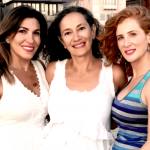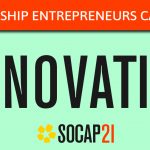Editor’s Note: A version of this post was originally published on the Stagen Leadership Academy blog.
I recently attended a leadership training at the Stagen Leadership Academy in Dallas. Ironically, my cohort was named Curie, celebrating the first woman to win the Nobel prize. When I arrived at the academy’s Athena room for the first time, everything looked crisp and clean: shiny white tables, ergonomic black chairs, flower centerpieces, and a perfectly arranged row of waters and juices on the back table. Then I felt my face flush, my heart quicken, and my breath grow shallow; the air was trapped in my throat. A voice in my head was saying, “You don’t belong here, not with all these brilliant leaders.” I was shrinking—and what’s more, I wanted to.
Just half an hour before arriving, if anyone had said I didn’t belong in the room, I’d have stood 10 feet tall and knocked them over. “Women deserve a place at the table,” I’d say. “Women can be highly effective CEOs.” But in a room with only one other female leader amid a class of 20, I wasn’t sure. Not at all. I thought, “I’m an impostor.”
Thankfully, I wasn’t allowed to hide for long.
The weird thing is that I grew up feeling seen. My father, a successful entrepreneur, was always supportive, even when I wanted to play baseball and ended up on an otherwise all-boys team. But I wasn’t only a tomboy. I played with Barbie dolls, too. My mother was always there, and she made sure my clothes were clean and there was something good to eat in the house. She encouraged me to feel good about myself. My paternal grandmother kept me grounded, reminding me that I had things pretty good. She told me more than once, “You need to be conscious of how you proceed in life, because you’re a ‘have,’ and there are a lot of ‘have-nots.’”
I began my career at PAR Technology Corporation, the company my dad started, working in a variety of positions before agreeing to leave when the company came under new management. After four years, I was asked to come back as president of the retail restaurant business — and that business was a mess. But messes are also opportunities, and I was increasingly intrigued by this thing called conscious capitalism that I was hearing about. Fred LeFranc, founding partner of Results Thru Strategy and someone I knew through the restaurant industry, said I needed to go to the 2014 Conscious Capitalism CEO Summit.
I hemmed and hawed, uncertain whether I was worth the $5,000 fee—and yes, I was head of a division that employed 750 people at the time. This sense of being an impostor runs deep. But I went, and amidst that incredible experience, a handful of people who heard my story told me I needed to meet a guy named Rand Stagen. On the final night of the conference, Rand was moderating a fireside chat between Brian Schultz, founder of Studio Movie Grill, and Sunny Vanderbeck, cofounder of Satori Capital.
As I watched, I immediately noticed that Rand had an amazing presence. I didn’t know anything about what he did, but I felt my curiosity stirring. When I got home and looked at his company’s website, I read about their leadership program, and it felt like what I needed. But I also saw that the program only accepted executives from private companies. I remember feeling a weight pressing down on my shoulders: PAR is public. I was brought back to wanting to play baseball as a young girl but without a field to play on unless I pushed my way through. I contacted Rand and said, “Look, I know you only work with private companies, but would you consider me for your program?”
Eventually, I got the call. Then, of course, I had to actually go. That meant making space in my busy schedule, traveling from New York, and walking into that room where this supposed magic would happen. Once there, I couldn’t fight the overwhelming sense that I didn’t belong. I struggled to find my own voice. I paid close attention. My first quarter visit, I left before the day ended, so I could get back to New York that night. It was a rather brilliant way to avoid small talk and how seized I was by my impostor syndrome.
Then on the second-quarter visit, I was paired with Corey Blake, founder of Round Table Companies. His vulnerability allowed space for my own. And oddly, being vulnerable allowed me to feel more rooted, more stable — like I belonged.
Gradually, I felt seen by the other members of the class — and by my coach, Paul Landraitis. And over time, I began to understand what I was up against in wanting to turn PAR into a conscious company. It wasn’t just the shareholders. I was going to have to do hard work on myself to become a conscious leader, and I was going to have to infuse consciousness throughout the culture of the company.
To top it all off, I would have to engage in that work while facing the lifelong challenge of being a woman in a male-dominated corporate world. On the one hand, I heard voices saying that, as a woman, I have to stay in my lane, my place. My mother was a stay-at-home mom, and although I never stayed home a day in my life, I still heard those voices — and they spoke loudly, reinforced by my actual experience. My entire career, I’d only worked for men. I never had the chance to work for a woman, so I’d been modeling my own behavior as a leader after the men I’d worked under. Not all of them, of course. Not the boss who’d see me working late and ask, “Don’t you need to go home to make dinner for your husband?” Why? I thought. He always makes dinner. He’s Italian!
And then there were the competing voices. The voices of my family, which told me I could do anything I set my heart to. The voices of my childhood role models, Supreme Court Justice Sandra Day O’Connor and tennis star Billie Jean King — whose accomplishments spoke volumes.
Through the course, I was able to find my own voice as a leader. And for that, I’ll forever be grateful. That voice led me to become PAR’s CEO. After 15 months, we discovered issues that made us realize we needed help with governance, but that was going to require intense focus which would take me away from the execution of our strategy. I made the hard decision to step aside from the CEO position and ask for help so I could lead our transformation.
I was disappointed with the self-imposed demotion, but it became an opportunity to learn to lead differently.
I had my reward: I was in full alignment with the members of my senior executive team. Now we’re able to be there for each other, to drive committed action, to engage in conscious communication, to achieve a higher level of execution, and to avoid the drama that could otherwise tangle us up.
As much as I changed at work, I also noticed that my work on myself led to me show up differently at home. I’m more present for my husband and children. Before, I was so focused on business that I was in my own world and my own head wherever I was. I wasn’t as nurturing of their needs as I could or might have been. I was experiencing the gift of being much more intentional about my close personal relationships.
In gaining access to presence, I was able to recognize how other people were showing up around me in my life, and I became more empathetic. I could be judgmental before—with other people, but particularly with myself. Now I’m kinder to myself, which makes it easier to be kinder to others. I find myself smiling as I share this: I’m seeing my new sense of self mirrored back to me through my self-assured 19-year-old daughter. That may be the greatest gift of all of this.
Prior to the shift in me, I saw my daughter behaving much like I was. She was emulating the way she thought she should be by my example. As I’ve changed, I’ve watched her become more empathetic and kinder to herself. She’s pursuing a degree in sustainability with the idea that she’d like to build conscious businesses.
Today, I can feel my power emerging — as a leader, as a woman, and as a person. I’m more vulnerable than I used to be, and I’ve finally grown comfortable with all I don’t know. I’m under no illusion that my journey is complete. The work changes as my world changes. I’m not a Jedi yet. If I am lucky enough to become one, I know the vision I will gain will simply illuminate how much still needs our attention.
Our world has so many needs. In the name of those challenges that require passionate, eager, and hard-working leaders with loving hearts, I want to invite other women to join me on this adventure, to become part of my story and to invite me into yours. Let’s build upon the legacy of women like Marie Curie, Sandra Day O’Connor, and Billie Jean King. It is not only time for more women to hold executive positions and to lead — it is time to serve our companies, our communities, our country, ourselves, and the children to whom we will hand this planet. Business can be an incredible force for good. Join me in making it so.






